2022 CORPORATE SOCIAL RESPONSIBILITY REPORT







CNUC understands the responsibility we have as a company and as individuals to strive to protect and improve all ecosystems, and to make positive environmental, social and economic impacts in the communities we serve. A sustainable business is good business, not only for our employees but also for our clients and the public.
At CNUC, we’re a leader in innovative solutions and value services that align with our core mission and values. As a 100% employee-owned company, our employees are at the forefront of every decision we make and our employees are the ones behind our success as a company.
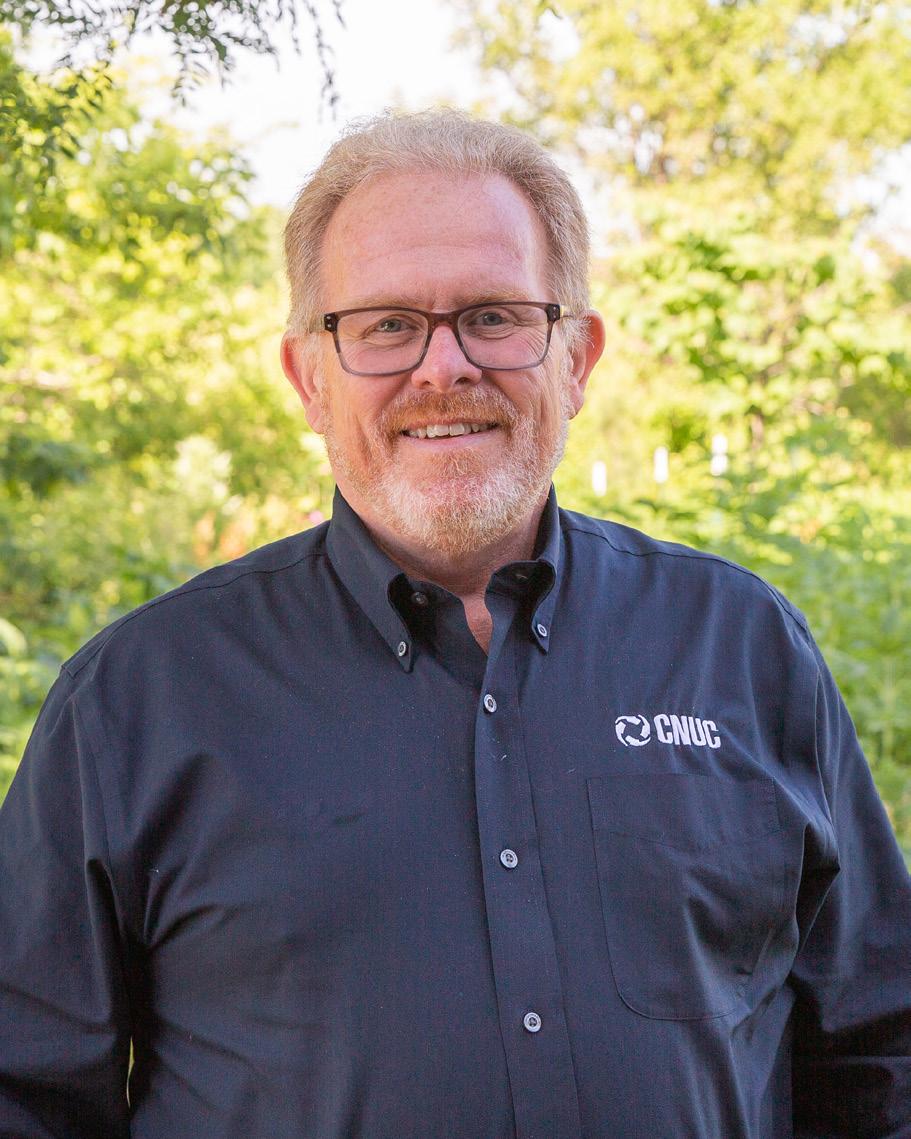
Our goal as a company is to educate and collaborate with members of our industry and communities to conserve and protect natural resources while maintaining economic viability, sustainable growth, and social harmony. The past year has been challenging with an environment that has been increasingly and rapidly changing, but we move forward with our commitment to sustainability.
Our business practices and operations have multi-generational impacts; we strive to minimize negative impacts while maximizing positive ones. In addition, CNUC has an environmental impact and sustainability policy that instructs our employees to be aware of any issues that may apply to their current contract. Given our vast geographical span, each region identifies potential environmental and cultural resources that may appear in their area, as well as appropriate actions to remediate potential problems.
Our team members are directly involved in a variety of organizations and projects that champion sustainability in the industry. I served as Chair of the Right-of-Way Stewardship Council (ROWSC) and have been involved in the development of this program since its inception in December 2012. ROWSC is an accreditation program that establishes standards for responsible right-of-way vegetation management along corridors. The program promotes the application of integrated vegetation management (IVM) and best management practices to
utility vegetation managers to maintain power system reliability and address ecological concerns. Randall Miller, our Director of Research and Development, is the primary author of the third edition of the ISA IVM BMP, and our Manager of Research and Development, Philip Chen, is part of the Rights-of-Way as Habitat Working Group.
This report highlights the progress we have made, and will continue to make, regarding:
‒ Safety
‒ Employee Well-being
‒ Environmental Sustainability


‒ Community Engagement
The entire management team at CNUC is committed to continual improvement – something you’ll see throughout this report and in your interactions with any of our team members. We believe that we should always look to the future, but never forget to reflect on accomplishments and missteps so we can continuously improve, for ourselves, our clients, and our communities.
2.27 90%
29.3% NEARLY


Here are a few highlights from the last year where we focus on our continual improvement: Workforce growth rate of employees report a positive experience with CNUC’s focus on safety, training and care of employee well-being
Annual incident rate

The following pages highlight how we incorporate environmental sustainability into our services and business operations using innovative processes, initiatives and technology.
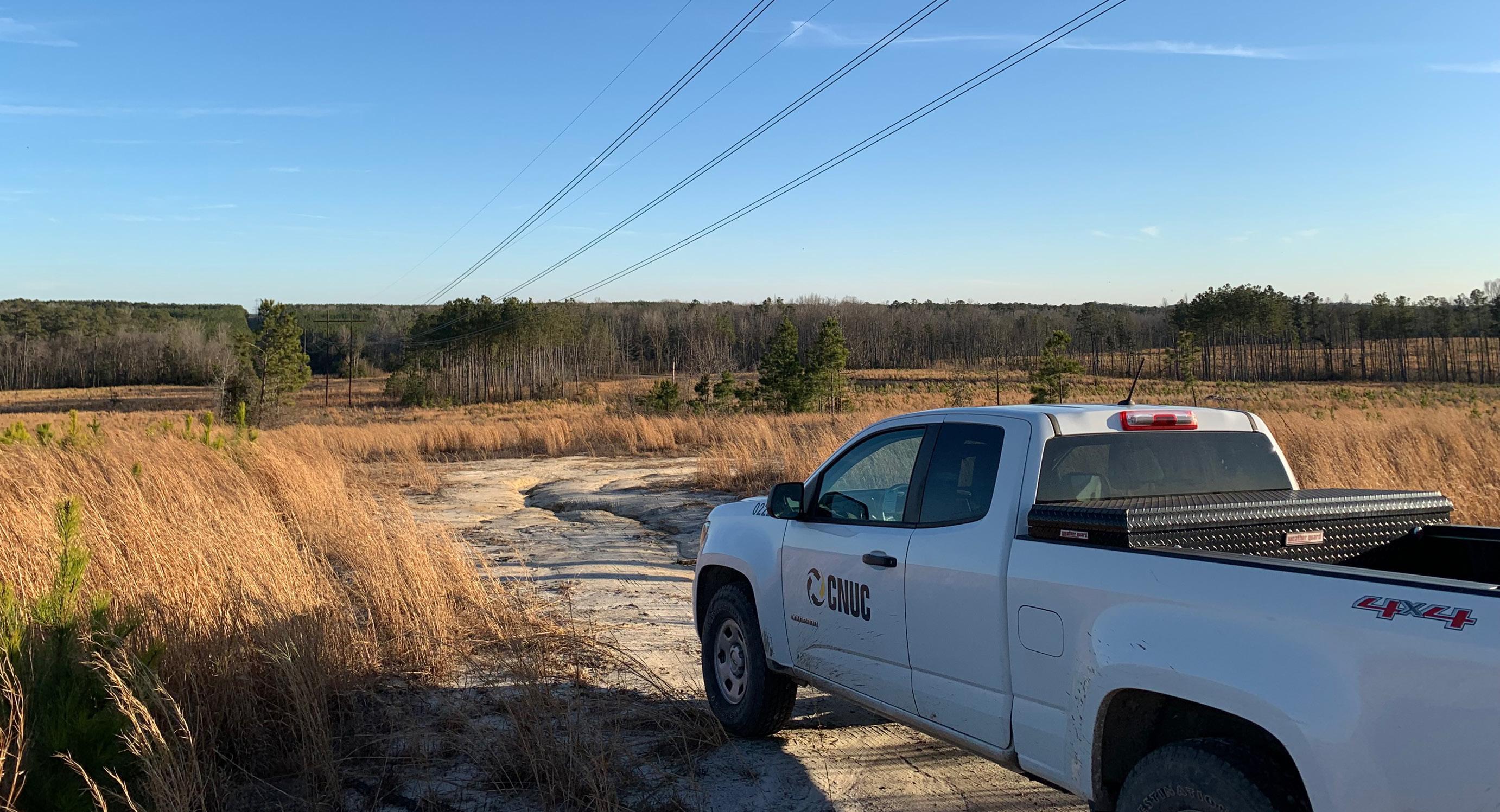
CNUC is the premier provider of innovative, economically sensible and environmentally sustainable vegetation management services. We assist our clients in achieving compliant, effective, efficient and defensible utility vegetation management (UVM) programs. We are committed to understanding this complex industry while growing and sharing with our clients to achieve operational excellence.
Founded in 1999, CNUC has spent the last two decades providing high quality UVM consulting services. In 2007, CNUC joined Wright Service Corp., a unique family of companies specializing in environmental services, with a number of sustainability initiatives taking place across the United States and Canada. Family is our foundation; it is who we are. Our employee-owners are our greatest asset and the heart of CNUC. Teamwork is how we operate.
Our consulting and operations team have command of utility vegetation management best management practices and legal and regulatory requirements. We partner with clients to improve their vegetation programs through inspection and auditing services, emergency response, consulting and research. These services are often combined with software and LiDAR solutions. Our expertise goes beyond operations by providing the largest and most comprehensive UVM industry surveys in North America.
We strive to seek out the best solutions using the latest technology and techniques. We always try to find a better way to get the job done. This mentality of innovation allows CNUC to remain a leader in the UVM industry.
Since our founding, we have successfully completed a myriad of complex projects throughout North America.


We partner with utility companies in adopting advanced UVM techniques and technologies that increase efficiency and provide higher return on investment.
We believe in giving back to the communities we serve and the environment we all share. We are only as successful as the communities we partner with, which is why we prioritize community involvement, giving back and volunteerism for our team.
CNUC’s board of directors is made up of a group of individuals that reside at the Wright Service Corp. (WSC) level. It is made up of three internal directors and five external directors as follows:
Scott Packard, Chairman and CEO of WSC

Austin Kennedy, President and COO of WSC
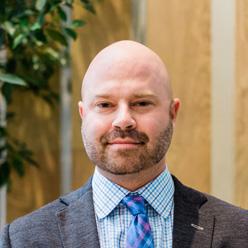
Jonathan Hicks, SVP and CFO of WSC

Terry McGonegle, Retired CFO of WSC, outside director
Nancy Wright, outside director
John Bruntz, outside director
Dick Rue, outside director
George Milligan, outside director
Scott Packard
Scott Packard joined WSC in July 1998. Three years later, John R. Wright appointed Scott to president and COO. In October 2002, Scott took on the position of chairman and CEO. Scott began his career after graduating from the University of Kentucky with a bachelor of science in accounting. Since then, he has held a number of executive positions prior to joining the executive leadership team at WSC. He served on the Tree Care Industry Association (TCIA) board of
directors from 2003-2009 and as chairman in 2009. In September 2016, Scott became the first recipient of the Management Action Programs (MAP) Disciplined Leader Award. This award was conceived to recognize select leaders who have consistently exhibited the qualities of a disciplined leader. Scott is also a past chairman of Area 4 Iowa Employer Support of the Guard and Reserve (ESGR) and presently serves as vice chairman. He was recently named to the board of directors of Trees Forever.
Austin Kennedy
Austin Kennedy joined WSC as general counsel in April 2013. Prior to joining WSC, Austin was an attorney in private practice for seven years in Des Moines, Iowa, practicing in many areas involving employment law, immigration law and litigation. In 2019, Austin was promoted to general counsel, chief human resources officer and senior vice president. As of January 1, 2022, Austin was promoted to president and chief operating officer. Austin graduated from Macalester College in 2000, where he received the Livingston-Patnode Award for his special contributions to the English Department. He then earned his law degree from Drake Law School in 2005. In 2015, Austin earned his Credential of Readiness from Harvard Business School’s HBX CORe program, which establishes competencies in business analytics, economics and accounting.
Jonathan Hicks
Jon Hicks joined WSC in 2008 as the controller for Wright Outdoor Solutions. In 2010, he was promoted to controller of Wright Tree Service and in 2020 he was promoted again to vice president and chief financial officer of WSC. Jon graduated from Iowa State as a Certified Public Accountant with a bachelor of science degree and a master of accounting degree in 2002. After graduating, Jon worked in various auditing and financial reporting roles within both public accounting and the private sector. Jon is a member of the Iowa Society

of CPAs and the American Institute of CPAs. Jon is also a member of the Risk and Insurance Management Society and is on the WSC Board of Directors. Jon is a large advocate of Employee Stock Ownership Plan (ESOP) structured companies. He believes the culture the ESOP structure creates allows employees the freedom to implement change and leave their personal mark on the company. Jon enjoys problem-solving and having the opportunity to help guide the company at a strategic level.
Terry McGonegle
Terry McGonegle joined WSC as the controller for Wright Tree Service (WTS) in June 1994. When the ESOP was formed in 2002, Terry was promoted to chief financial officer of WSC where he helped transition the company from a family-owned to an employee-owned and served as CFO until December of 2019 upon retirement. Terry started his career in public accounting and worked in the agricultural and construction industries before joining WTS. He has served on the audit committee for the Tree Care Industry Association and finance committees for both the Utility Arborist Association and TREE Fund. Terry is also a past president of The Iowa-Nebraska Chapter of The ESOP Association.
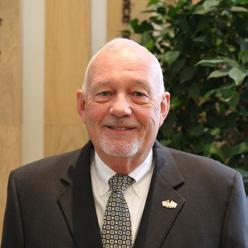



Nancy Wright
Nancy Wright is a cum laude graduate of Drake University majoring in business communications. Following graduation, she had a long career in the group life and health business, starting with Principal as an underwriter and later selling group life and health insurance to Iowa school districts through Holmes Murphy & Associates. Other positions include marketing director for a major group medical carrier and account manager for a national insurance
brokerage. She was also active in the Iowa Health Underwriters as a board member for six years and president for two years. This involved working with state and national legislators regarding healthcare legislation. Nancy is currently retired.

Dick Rue
Dick is retired and served for 23 years as senior vice president & CFO and board member at ITA Group, Inc. a West Des Moines incentive marketing company. Dick has been a CPA since 1978 and was employed during his first five years after college in public accounting. He is a past member of the American Institute of CPAs, the Iowa Society of CPAs, Financial Executives International, where he was a past Iowa Chapter president and board member, and the ESOP Association. Dick’s experience includes serving on the UNI College of Business Dean’s Advisory Board, the President’s Advisory Board of Grand View University, the Board of Directors of Precision Pulley & Idler, six years as State Chairman of Employer Support for the Guard and Reserve (ESGR) for Iowa and two years as Chairman of the National ESGR Executive Advisory Subcommittee. Additionally, Dick is a volunteer at the Iowa Gold Star Museum, a volunteer with United Way of central Iowa and he actively works as a volunteer financial counselor with the Small Business Development Center in central Iowa.
John Bruntz
Currently retired, John Bruntz was the chairman and CEO of The Boulder Company, an industrial product distributor with operations in four states and serving an eight-state market region. He held the position from 2014 to 2019. Prior, he was the CEO of The Wittern Group, one of the world’s largest manufacturers of automatic
merchandising equipment and controlled access technology. He became the CEO in 1990 and began work for the company in 1985. John also serves as a director for Dexter-Apache Holding, Inc., a $300MM revenue ESOP company with more than 900 employees across six different business lines. In addition, Bruntz is on the board of directors of Cementech, Inc., an ESOP company headquartered in Indianola, Iowa. Cementech is the market leader in the production of volumetric cement mixers. He is a licensed attorney who graduated from the University of Iowa, College of Law and has published articles in law journals in the areas of labor and employment law. He has been involved in numerous civic organizations including ChildServe, the YMCA of Greater Des Moines and the Greater Des Moines Partnership.
George Milligan
George Milligan is a 1978 graduate of Iowa State University, earning a B.S. in economics with a minor in industrial administration (business). From 1978 to 1985 he worked for Continental Grain Co. in various trading and management positions in four different locations. From 1985 to the present, he has worked at The Graham Group, Inc., and as its president since 1988. The Graham Group, Inc. is a diversified real estate development company and general contractor. He has been involved in many central Iowa charities and boards. He currently serves on the board of two public companies, United Fire Group, of Cedar Rapids, Iowa, and West Bancorporation, Inc., of West Des Moines, Iowa. Both are Nasdaq traded companies.
The CNUC executive team consists of the following team members:


Derek Vannice
President and COO Derek Vannice joined CNUC in 2011 after decades of success at two leading industry organizations, the International Society of Arboriculture (ISA) and the Utility Arborist Association (UAA). Before his career with those organizations, Derek held vegetation management positions in both transmission and distribution at two different utilities in Indiana. Derek served on the review committee of the original and first revision of the ISA Integrated Vegetation Management (IVM) Best Management Practices (BMP) as well as the Utility Pruning BMP. As ISA Director of Certification, Derek increased the program’s 2,000 Certified Arborists to more than 26,000 Certified Arborists in 50 countries. Concurrently, as UAA Executive Director, Derek was responsible for many initiatives and programs that advanced the organization and industry regarding reputation, technology, and training. He served as the primary spokesman for the utility arboriculture industry and provided expert testimony in regulatory hearings. Derek was the 2008 recipient of the ISA Achievement Award and the 2011 recipient of the UAA President’s Award. Derek holds a bachelor’s degree in forestry and a Master of Business Administration and has done independent consulting work with utilities and line clearance companies across North America.
Josh Beaver
Josh joined CNUC in 2010 working as a lead consulting utility forester in Chattanooga, Tennessee. He was later promoted to regional supervisor and has advanced through the management ranks to his current position of Senior Vice President. He is responsible for the oversight of CNUC’s contracts throughout the United States and Canada. He has been published in the Utility Arborist Newsline and has presented on a variety of industry topics throughout the United States. Along with a proven record of success working with utilities, Josh is an ISA Certified Arborist and Certified Utility Specialist and currently serves on the UAA’s
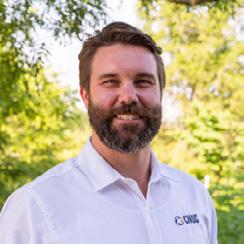
Professional Development and Events Committees. He also provides onsite consulting and training on an ongoing basis. Josh holds a bachelor’s degree in environmental science along with completing the Harvard Business School Credential of Readiness (CORe) program.
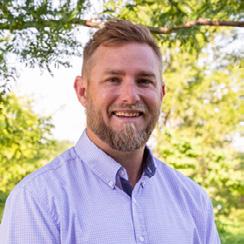
Jimmy Williams
Jimmy joined CNUC in 2013 as a Project Manager on the PG&E contract in Northern California. Throughout the years he served in a variety of different roles from regional supervisor, regional manager and now, vice president. He has over twelve years of experience within the industry and currently oversees CNUC’s operations in the West. His primary objective is to support his management team and ensure we are providing the highest quality of service to our clients within his region. He has a bachelor’s degree from Simpson College and is an ISA Certified Arborist, ISA Certified Utility Specialist, ISA Tree Risk Assessment Qualified and has his California Firefighter 1 Certification.
Randall H. Miller
As Director of Research and Development, Randall brings more than two and a half decades of experience to CNUC, previously working as director of vegetation management for PacifiCorp serving on ACRT’s board of directors. He has been Chair of the TREE Fund Board of Trustees, president of the Utility Arborist Association, and twice Chair of the Edison Electric Institute Vegetation Management Task Force. He has also served on the ISA Certification Test Committee and many other industry committees. Randall is the author of the ISA IVM BMP and co-author of the Utility Specialist Study Guide. He speaks widely on arboricultural topics and performs formal UVM surveys of North American utilities. Randall obtained a Bachelor of Science in Horticulture from the University of Wisconsin-Madison along with a master of science in Urban Forestry from University of Wisconsin-Stevens Point. He also is a BoardCertified Master Arborist, an ISA Certified Arborist Utility Specialist, Tree Risk Assessment Qualified and was the recipient of the 2005 ISA RW

Matthew Searels
Matthew began his UVM career with CNUC as a consulting utility forester (CUF) at Middle Tennessee Electric Membership Corporation in Murfreesboro and has successfully supervised special projects and managed daily operations for multiple transmission and distribution contracts concurrently in select CNUC management team positions. He is responsible for oversight of long-term UVM contracts throughout the Mid-West, South, and New England. Matthew has his bachelor’s degree in Environmental studies along with a bachelor’s in Business Administration. Additionally, Matt is an ISA Certified Arborist, Utility Specialist, serves on the UAA’s Events Committee, has participated with Tour des Trees event each year since 2019, and is President Elect of ISA Southern Chapter.
Richard Hauer, Ph.D.
Dr. Hauer joined CNUC in 2022 as the director of urban forestry with over three decades of experience. As an early career professional, Rich gained experience as a practicing arborist and urban forestry consultant. These experiences later resulted in overseeing the Shade Tree Program in Minnesota. Rich has served as a Professor of Urban Forestry for the past two decades, and he remains professionally active. He served as president of the Arboricultural Research & Education Academy, Minnesota Society of Arboriculture, and Wisconsin Arborist Association. Dr. Hauer also served as chair of many professional and academic committees. Rich is co-author of the textbook Urban Forestry: Planning and Managing Urban Greenspaces (2015). Rich is active in the development and publication of urban forestry research with over 180 publications. He also speaks regularly at local to international conferences with over 450 professional talks. He is an associate editor of the Journal Urban Forestry & Urban Greening.

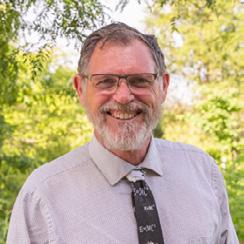


We help organizations identify and capitalize on opportunities to enhance their UVM program. With our industry knowledge and experience, we can examine the organization and its operations, help focus their strengths, drive their potential, and develop solutions to their toughest challenges.
We bring innovative solutions to every job site. Our knowledgeable team provide risk assessment, quality assurance, planning advice, and many more inspection and auditing services.
Innovation and knowledge are two of our core values — we pride ourselves on our ongoing research. We leverage research findings, along with our knowledge of best practices, to identify opportunities for utilities of every size across North America to improve their UVM programs. The most notable project within our research area of expertise, is our UVM Survey, the largest and most comprehensive survey of UVM in North America. It is a utility company’s best source for comparing its UVM program to those of its peers and serves the industry as a whole by identifying trends, best practices, research and development needs.
At its core, urban forestry is about creating and maintaining sustainable communities through trees. Our team created the standard benchmarks for crafting practical urban forestry management plans. Our contributions grow into lasting community connections.
Even with modern innovations and technology, natural disasters have a way of reminding us that we are still at the mercy of Mother Nature. When disaster strikes, our clients rely on our experienced team that is ready to provide relief and restore services to the public in a safe and timely manner.
CNUC founded by Stephen Cieslewicz and Robert Novembri
Derek Vannice joined CNUC after 18 years as Executive Director of the Utility Arborist Association
‒ To assist our clients in achieving compliant, effective, efficient, and defensible utility vegetation management programs.
‒ To provide attractive value appreciation to our employee owners.
‒ To provide team members with an environment that enables them to achieve their personal and professional goals.
‒ To make a positive contribution in the communities we serve.
‒ To provide appropriate strategic support to our parent and sister companies.


‒ To drive the industry in the areas of technology and knowledge.
Vision
CNUC is the premier company in providing innovative, economically sensible and environmentally sustainable vegetation management services.
It is everyone’s responsibility, we each own it.
We abide by the highest ethical standards.
We maintain a peerless understanding of our industry.

We continually strive to exceed our customer’s expectationsand our own expectations.
We anticipate our clients’ needs and we deliver creative services and solutions.
FAMILY
It is our foundation; it is who we are.
It is how we operate and we hold each other accountable.
Our Corporate Social Responsibility Mission Statement

CNUC is committed to fostering a passionate culture dedicated to providing high quality environmental services for the benefit of the communities in which we live and work.

KPI Overview
Key performance indicators (KPIs) for CNUC will be used to track the progress in key target areas and will be used in the coming years to gauge progress. These will help shape goals to drive continuous improvement.
As an employee-owned company, CNUC and its family of companies knows that our greatest strengths come from our employees. With a people-focused culture, we are committed to being an equal opportunity employer, creating an inclusive work environment where our employees are heard, respected and valued, and empowering our employees to achieve their personal and professional goals. The result will be sustainable success and satisfaction for our employees and customers.
Safety Employee Well-being Environmental Sustainability Community EngagementSafety is our number one value. Our employees are trained on a consistent basis to ensure best safe practices are in place and mitigate any potential risks or hazards. Internal protocols are routinely reviewed and updated by our risk and safety departments to ensure the latest trainings and protocols are followed so that our employees can get home safely each and every night. Our employees follow the Brother’s and Sister’s Keeper motto, striving to achieve zero OSHA recordable incidents.
Our employees create a rich work environment. Our family culture is what makes CNUC unique and attractive to the next generation of the workforce. This includes a safe, enjoyable, diverse environment that offers opportunity for professional growth. As competition for talent grows, CNUC is committed to offering an attractive workplace to retain and foster talent through our family of companies at all levels. CNUC is proud to be a 100% employee-owned company. Continued training, education and development, and our employees’ well-being are top of mind.
We are in the environmental services industry, and we strive to protect and preserve all ecosystems. We continue to reduce our footprint and promote carbon positive practices at our offices and in the communities we serve. Our North American headquarters based out of West Des Moines, Iowa, began a remodel phase in 2020 with environmental and economic sustainability in mind. This posed an opportunity with many working from home to remodel the existing buildings on the headquarters’ campus to accommodate the growing amount of support staff while also providing the infrastructure needed for the flexibility with the newly enacted Work from Home Policy.
CNUC supports activities that benefit our employees and add value to the communities where we live and work. Through monetary and in-kind donations such as labor and education, we’re able to support various causes and organizations that align with our values. We take pride in building and developing relationships with our employees, clients and communities.

Workforce growth rate
29.3% NEARLY


2.27 90%
Annual Incident Rate
of employees report a positive experience with CNUC’s focus on safety, training and care of employee well-being
12,520 Hours of Weekly Safety Training Conducted

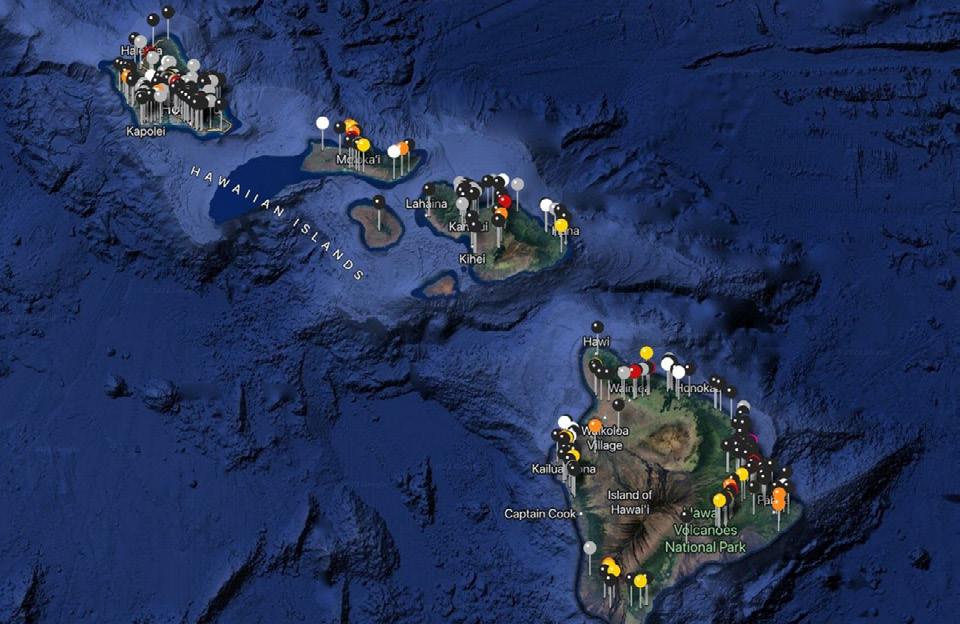
Early in 2022, the CNUC Research and Development (R&D) team was hired to complete a review of a utility vegetation management program for one of our clients in Hawaii. While CNUC has experience completing UVM program reviews across the United States, this was unique in its remoteness, dispersed service territory and diversity of utility forest.
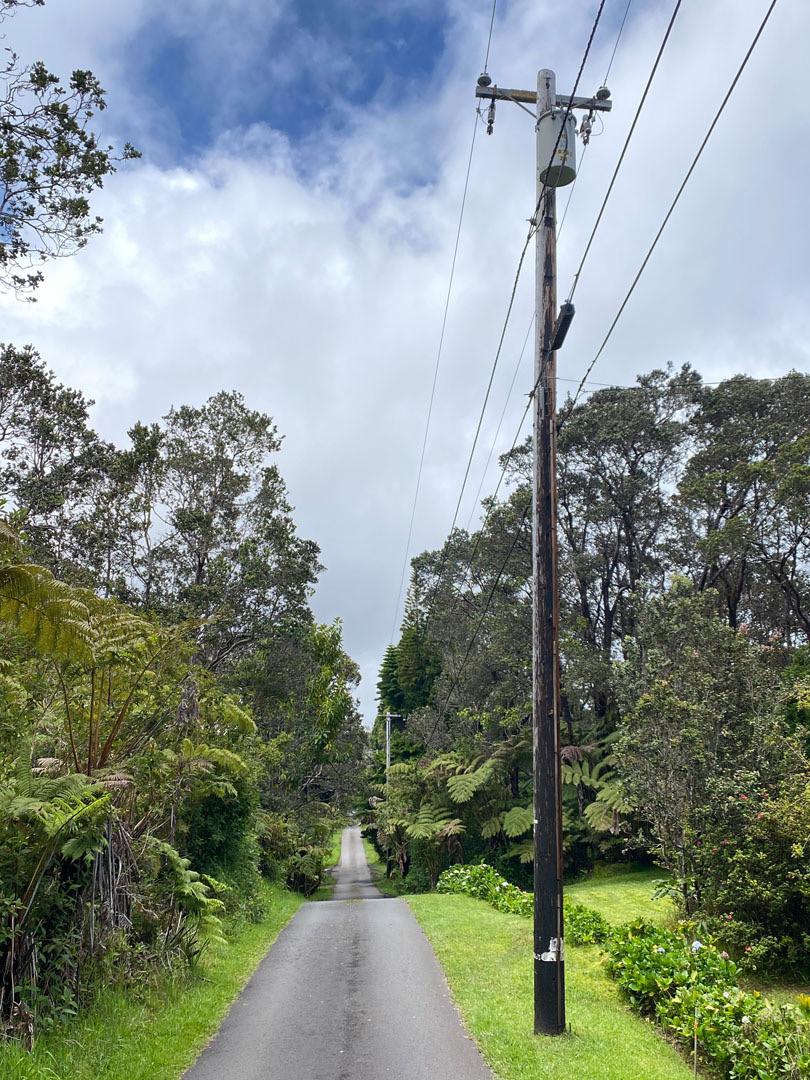

Alan Hoffman and Lead Consulting Utility Forester (CUF) Garrett McRoberts (regularly serving California) were asked to complete a field assessment of vegetation conditions on the client’s system. Alan grew up on the island of Kauai and Garrett had years of experience previously working on the islands. This knowledge, along with them both being certified arborists, made them the perfect fit for this opportunity. After sample points were randomly selected and mapped out using GIS, Alan and Garrett were tasked with visiting these sites across five Hawaiian Islands.
While the hard work was being completed in the field, the rest of the R&D team worked on the other aspects of the program review: conducting interviews with staff and contractors, reviewing program documents and benchmarking their program against our UVM survey. With Alan and Garrett on Hawaii Standard Time, multiple team members across the mainland U.S., and some vendors located as far away as Australia – virtual meetings for this project posed a unique scheduling challenge.
The report is currently being finalized, and the project will end with its submittal and follow-up presentation to discuss key findings and recommendations. The research and development team is looking forward to opportunities on the horizon which may require assistance from qualified CNUC employees in other divisions. We’ve enjoyed being able to help another utility improve its practices, and to learn about the unique difficulties they face.


At CNUC, our primary capabilities are in forestry and arboriculture. However, we have gained a great deal of knowledge in electric power infrastructure during our decades of work with power companies. Starting in 2020, we began exploring service offerings in electric asset inspections. We started this service with visual infrastructure assessments, including powerline components and pole inspections. Today, we visually inspect over 100,000 wood poles annually.
We have continually examined and tested technologies that can enhance this new service offering. In this exploration and testing, we began utilizing a resistograph to perform non-destructive wood pole testing, completing our first project with a client in Northern California. Electric utility companies have regulatory requirements surrounding pole inspection and testing to add assurances against wood pole failure. Historically, this work involved highly invasive inspection techniques and a need for dangerous, carcinogenic chemicals. Using the resistograph, we can perform these inspections without the destructive drilling, excavation, and chemical usage typical in other methods.
The resistograph uses a drilling needle (a fraction of an inch in diameter) to measure the resistance of the wood pole’s internal condition. This data then provides a readout which provides information about any internal decay and produces a pass or fail rating, including decay percentage data. Individual measurements take less than a minute and can be done by a single-person crew. This data provides our clients with the information they need to manage their wood pole assets and helps avoid unnecessary replacement of poles, thus saving money and resources. Since the drilling needle is so small, it eliminates the need for treatment with harsh chemicals. The drilling can be done to test the part of the pole that is below ground, no soil excavation is necessary. Through this new offering, we have quickly provided insights to our clients with low impact on assets and the environment.
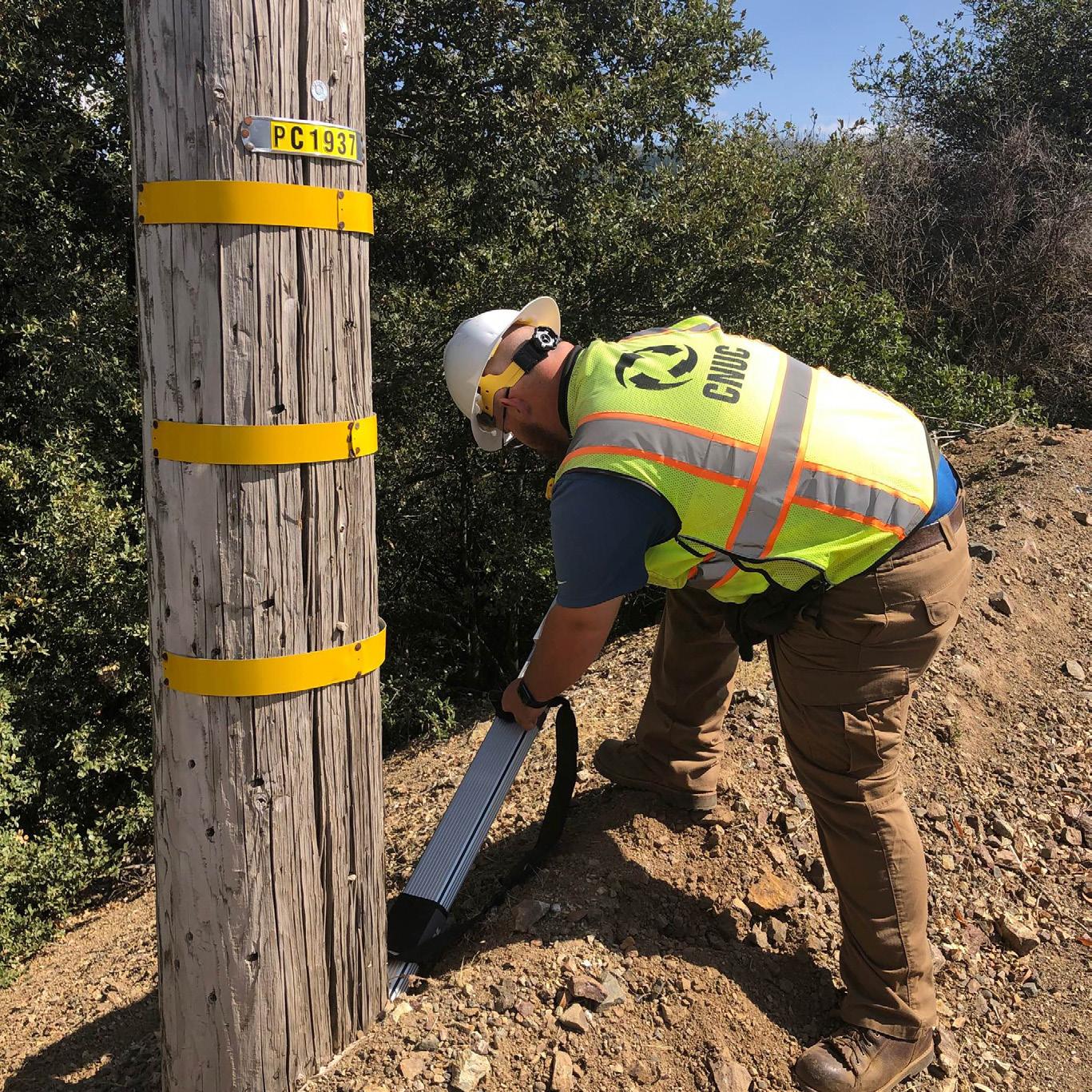

Safety is our number one value. Our employees are trained on a consistent basis to ensure best safe practices are in place and mitigate any potential risks or hazards. Internal protocols are routinely reviewed and updated by our risk and safety departments to ensure the latest trainings and protocols are followed to ensure our employees can get home safely each and every night. Our employees follow the brother’s and sister’s keeper motto, striving to achieve zero OSHA recordable incidents.
 Safety Employee Well-being Environmental Sustainability Community Engagement
Safety Employee Well-being Environmental Sustainability Community Engagement
CNUC tracks and reports accidents. Accidents are tracked by company with goals established for reduction. These accidents and near misses are used in training materials to identify preventative actions to continue to enforce.
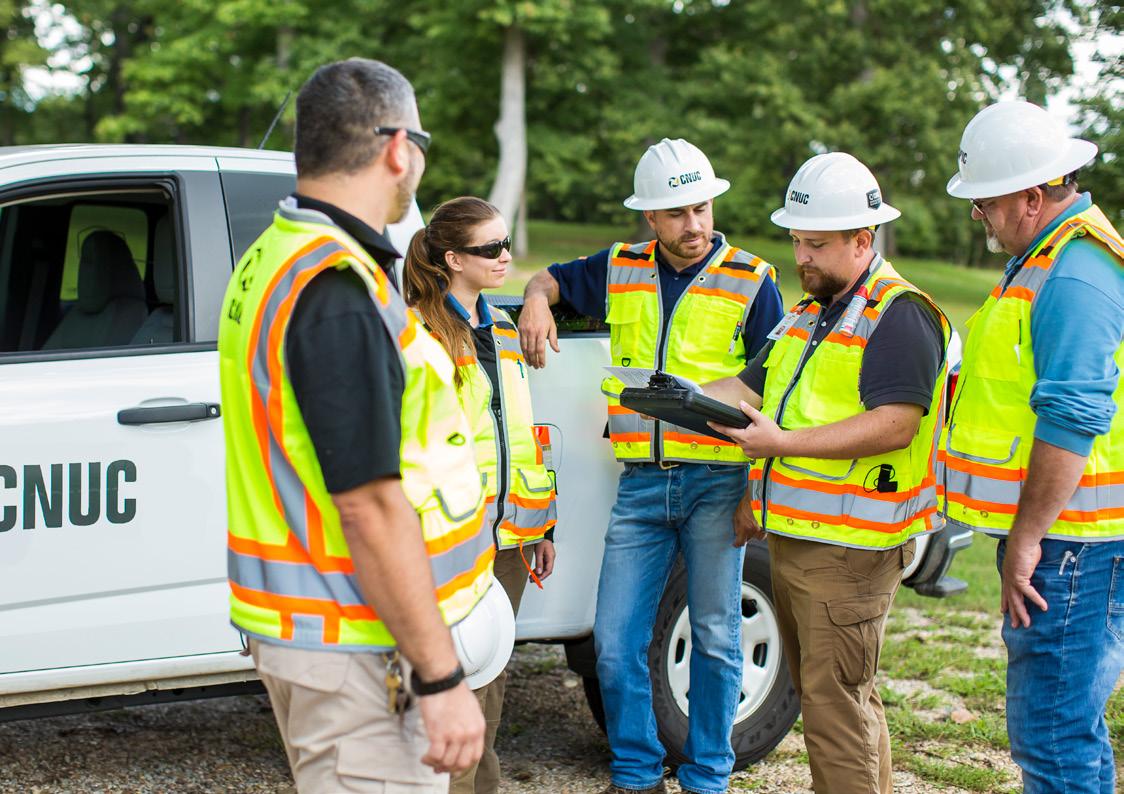
Days Away, Restricted or Transferred (DART) rate represents OSHA injuries or illness that results in days away from work, restricted duty, or transfer of duties. This is because only the more severe OSHA recordable injuries and illnesses are included in the DART rate which was 0.57 for 2022.
2022 Stats


2.27

Annual Incident Rate
0.25 0.57
Claims per Employee
Days Away Restricted or Transferred
Every new employee undergoes a safety onboarding training program on their first day of work. Training topics are discussed for at least 30 minutes each week as a safety refresh for all employees. Topics include vehicle safety, equipment safety and preparation for natural disasters, wildfires, and heat illness. Wildlife awareness training for hazardous plants, insect bites, canines and reptiles is also included.
- 12,520 hours of weekly safety training
- 713 hours of cyber security training


- Average of 25 hours of safety training per employee annually
- Average quarterly safety quiz scores of 85%


The CNUC team employs Geotab, a fleet monitoring system that uses telematics and GPS technology and hardware which evaluates driver safety regarding seatbelts, speeding, idle time, harsh braking and harsh cornering, as well as backing up, specifically backing up when leaving. Lytx is a dash camera solution CNUC uses that grants managers an extra set of eyes within the cab of a vehicle. A set of two lenses capture internal and external (forward facing) footage. Video footage can be reviewed and coached to improve driver safety and identify opportunities within the fleet to correct and improve unsafe behavior, as well as recognize drivers when exemplary behavior is exhibited. Each month, the employee with the saftest driving rating is recognized as the Safe Driver of the Month. An additional recognition is offered through the Safety Steward program, where all employees that were incident free receive a certificate and Safety Steward patch.
SAFETY: 2.27 annual incident rate
We want to make sure we are doing everything in our power to provide a safe work environment and make sure employees have all the necessary equipment and training to work safely. Questions on our survey regarding safety were some of the highest scoring. This is an area where CNUC will not cut corners or take unnecessary risks. Our expectation is that all of our employees feel the same way. We continued this commitment by putting a safety manager in place, and we fully believe we will take the next positive step in our safety program in future years.
- Completion rate: 77%
- Passing rate: 94%
- Average score: 85/100
At CNUC, we like to say safety doesn’t happen by accident. In fact, it’s our safety slogan. It helps keep us accountable for our own safety and that of others, or as we call it – being a safety steward. Safety is our top value, and it requires a strong commitment, continuous learning, and participation from every member of the team to build a culture of safety. CNUC is proud to recognize 175 individuals for ending 2022 incident-free. Recipients received a certificate and Safety Steward patch.
The Safe Driver of the Month honors and recognizes employees who demonstrate the highest level of safety and awareness when behind the wheel. The Safe Driver of the Month is awarded to the driver that traveled the greatest number of miles throughout the month with the best overall driver analytics and safety scorecard. Each awardee has their picture taken for the CNUC monthly update (an internal communication) and it is also posted to social media. The driver is then recognized during the allhands safety call at the end of the month.
EMPLOYEE ENGAGEMENT: nearly 90% of employees report a positive experience with CNUC’s focus on safety, training, and care of employee well-being.
How our employees feel about our training and development programs was a strong takeaway from our annual employee survey. Safety, Knowledge, Teamwork, Innovation and Excellence are all core values of CNUC. Our ability to live by these core values is tied to how well we train and develop each of our employees. We are continuously reviewing our training programs, looking for ways to develop each member of our team professionally. Based on survey results, employees agree that we are doing a pretty good job in this area. That said, we continue to look for ways to train and develop each employee as they move forward in their careers as consulting utility foresters.
2022 marks the first full year of CNUC using our Good Catch/Near-Miss form. This form is used by employees to report everything from close calls
402,225 TOTAL MILEAGE OF 12 SAFE DRIVER OF THE MONTH AWARDEES
to acts of safety that go above and beyond. Every event submitted is discussed during the all-hands weekly safety meeting to share lessons learned, raise team awareness, and recognize employees for being their Brother’s and Sister’s Keeper.
Total # of Submissions - 178
GOOD CATCH: Environmental Hazard- 40
Equipment Problem- 56
Other- 38


CPR & First Aid
NEAR-MISS:
Personal injury- 34
Property Damage- 10
CPR and first aid training is encouraged and reimbursed for employees to receive their certification and maintain their certification. CNUC team members are trainers.
Cyber Security by the numbers
713 70%
WSC’s Information Technology (IT) Department is dedicated to cyber security and business continuity. In 2019, an Information Security team was created to improve our security posture and execute yearly strategic security roadmaps, updated annually; by doing so, this maintains and strengthens our company’s ability to protect company and client data. The team conducts an annual comprehensive security assessment in tandem with monthly vulnerability scans and remediates identified issues. Our SIEM platform, AlienVault, monitored 24/7/365 by ProCircular, is utilized to help improve our detection and prevention of attacks on our company’s equipment year-round.
A security awareness program was launched in May of 2020. Employees undergo training to spot ‘phishing’ scams and other malicious emails or attacks. These fraudulent requests are sophisticated and can use known company contacts to lure others into sending funds to illegitimate recipients or compromise confidential data and information. On a monthly basis, employees are tested internally and if the employee fails, they are required to go through additional training and, in some cases meet, with human resources (HR) and IT for performance improvement. As scams are ever-changing, training and tips are provided to arm our employees with the knowledge to be a digital Brother’s and Sister’s Keeper and ensure we protect our family of companies and their employees.
- Conducted a Tabletop Exercise to Prepare for Any Security Emergency
- Rolled Out BitWarden Password Manager
- Weekly Trivia During Cyber Security Awareness Month in October


Security: In 2022, ensure company participation and improvement in security awareness training.
Incident Rate: Reduce incidents and near misses to reduce annual incident rate.
Training: Continued use of Geotab to improve safe driver metrics.
293
Cyber training completion total hours executed on all monthly cyber security trainings hours of required annual cyber security trainings
- Deployed the KnowBe4 Learner App to All Company Mobile Devices
- Made Improvements to Our Security Posture with Our vCISO Project and Extended Through 2025
In 2023, WSC will continue to implement tools and training for increased company preparedness and due diligence against increasing cyber security risk.
Cyber Security Training: Ensure company participation and improvement by 5% or 200 hours of additional security awareness training.
2022 Accomplished Goals

Our employees are at the heart of every decision we make. First and foremost, their safety is our highest concern. Through our culture of safety, we have been able to build a workforce who trusts us as an organization. We are invested in the professional growth of our employees. We provide opportunities to earn certifications, attend regional meetings, join CNUC committees and learn through customized trainings. We provide a safe, enjoyable, diverse environment that offers opportunities for professional growth within the company. As competition for talent grows, CNUC is committed to offering an attractive workplace to retain and foster talent.
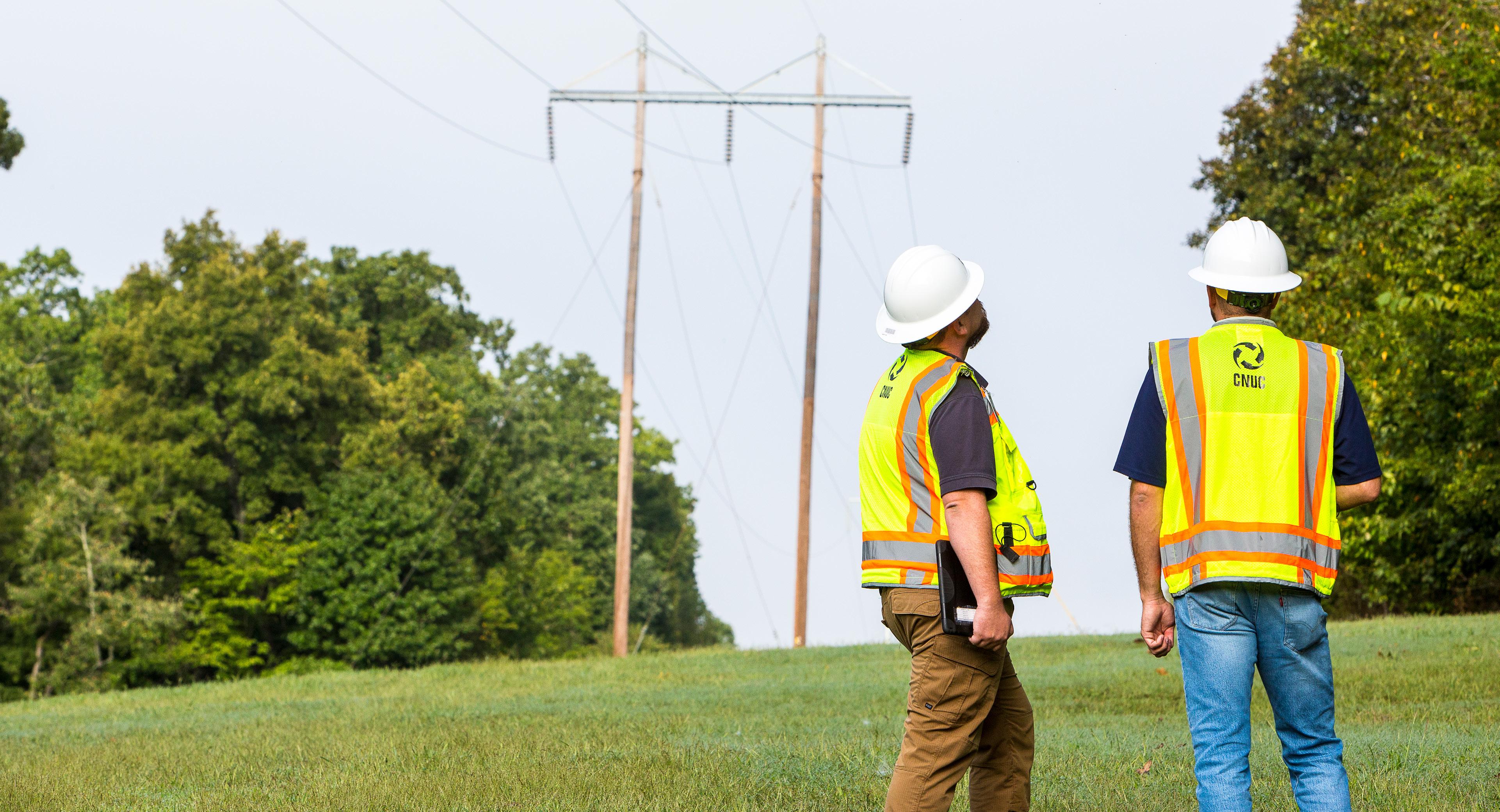 Safety Employee Well-being Environmental Sustainability Community Engagement
Safety Employee Well-being Environmental Sustainability Community Engagement
CNUC takes pride in its employees and their diverse backgrounds. We have employees across North America, including 31 states. Our total workforce increased by 29.3% in fiscal year 2022.
With the introduction of a Human Capital Management (HCM) system in the summer of 2021, CNUC has continued to improve digital infrastructure, workplace processes such as recruiting and onboarding, and track workforce demographics that we’ve reported on in the following pages.
Employee distribution numbers are based on fiscal year 2022, meaning October 1, 2021, through September 30, 2022. As of September 30, 2022, CNUC had 499 employees, a 29% increase from 2021. During that time, CNUC had 272 new hires.
These numbers do not include contingent workers who are contracted for work through external vendors or independently.


We recognize the importance of creating an environment in which all employees feel valued, included, and empowered to do their best work and bring great ideas to the table. Our Diversity and Inclusion (D+I) Committee was formed to give employees a chance to share their unique experiences, perspectives, and viewpoints. In 2022, some of the goals we focused on included spreading awareness of the Employee Assistance Program, developing strategies to recruit diverse talent, and using company demographics to discuss continual improvement of company culture. As our company grows, we are looking forward to completing more goals in 2023.
CNUC is also working to expand Personal Protective Equipment (PPE) options for all employees. This has included adding women’s sizing for safety vests and big and tall options. There are still steps being taken to improve accessibility and we will continue to track this progress in the coming years.
In addition to these initiatives, CNUC is continually looking to enhance our culture. CNUC culture reflects our core values, particularly the core value of family. It can be difficult to cultivate and maintain a family feel with employees working remotely across North America. In recent years, CNUC has been leveraging Microsoft Teams to increase the ability of team members to collaborate, network and engage. In 2022, one of the channels with the highest engagement was the CNUC Photo Club. 2022 saw 141 photos submissions with contribution from 29 team members. The CNUC Photo Club allows team members to show off their prowess in photography and enables us to see the various places and sites CUFs see each day while on the job. Photos contributed to the CNUC Photo Club are utilized (with credit) for CNUC social media posts, reports and presentations.

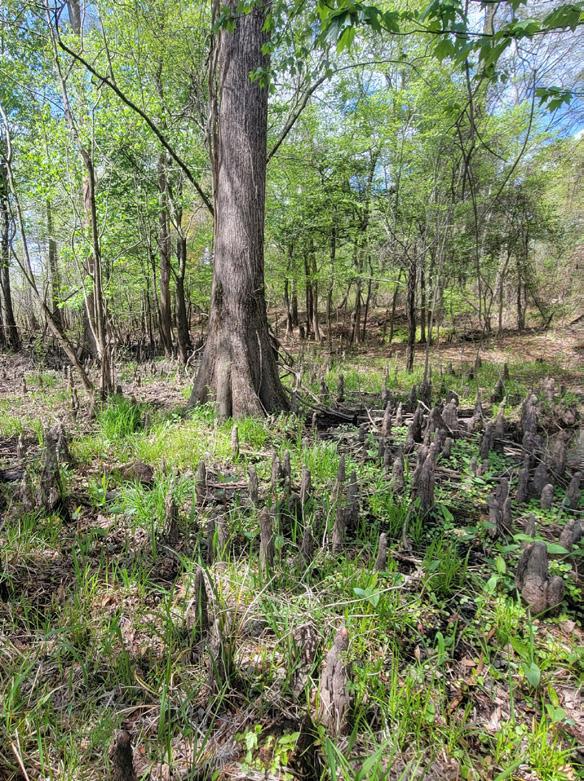
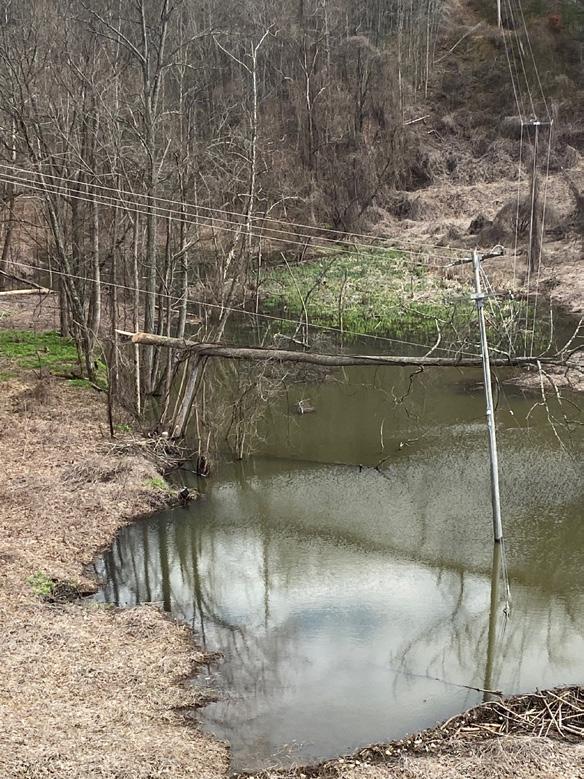

CNUC’s employee handbook outlines several employment policies, procedures and practices. This contains equal opportunity employment policies, a code of conduct policy, business ethics statement, a harassment policy and a protection against retaliation policy. Management and human resources staff have an open-door policy as well to report incidents and provide suggestions to improve the workplace.

CNUC conducts a formal orientation for all new hires which includes a comprehensive review of our company history and culture. New employees walk away with an understanding of our vision, mission, and values since we take time to review each in detail. Particular focus is also placed on job-related safety topics, key policies and procedures, and employee benefits and resources. Since we are an employee-owned company, we discuss our ESOP program so new employees have a better understanding of what the expectations are as employee owners. Our employee development program is also discussed in detail so that they know the importance of setting personal and professional goals. In 2022, 272 onboardings were completed.

Wright Service Corp. University (WSCU) is a learning platform that documents and tracks online training. WSCU creates the opportunity to reach every employee in the company who has a company email for training and continued learning. Topics include management, leadership, customer service, productivity, tools, tips and more. The Training and Development Department have increased course offerings significantly in the Learning Management System (LMS). More than 8,000 LinkedIn Learning courses are available to employees. In addition, new employees will be assigned training on WSCU to review topics such as:
- Harassment and discrimination
- Employee Stock Ownership Plan (ESOP)
- True Colors
- Customer service
- Timesheet tracking
- Retirement savings, and enrolling in a 401(k) or Roth
- Accessing the company clothing and apparel store
individual development options based on needs and desires. Additional leadership and professional development training programs and mentorship opportunities are available for employees.
In 2022, CNUC had 155 International Society of Arboriculture (ISA) certified arborists. There are also 54 certified utility specialists within the company. We encourage our employees to obtain additional certifications to foster their continuing education.

The True Colors® Personal Awareness & Success training guides participants through concepts of self-awareness and effective communication. This fun, interactive workshop helps individuals better understand themselves and others. It creates a common language, providing a foundation for genuine relationship building and honest dialogue. Four employees are certified True Colors facilitators. In 2022, the CNUC Leadership Academy had 21 employees participate in a True Colors workshop. There were also 117 total participants during the year which accounted for 271 hours of training.
The Rewarding Success Program recognizes employees who exhibit the values of CNUC in an exemplary manner. 116 CNUC employees were recognized through this program in 2022.

Wright Workshop. Each represented their own division within the United States and Canada.
The LEAD Program is the preeminent leadership development program offered by WSC. The program currently takes place over the course of 18 months and consists of:
- Facilitated, in-person sessions at WSC headquarters in West Des Moines, Iowa
- Job shadow opportunity
- Participation in a mentor program
- Capstone project and presentation
Lunch and learns were reintroduced in May, hosted by the Training and Development Department once a month. They focus on content in the areas of business knowledge within our family of companies (finance, strategic planning) and interpersonal skills that improve operational performance.
The Training and Development Department offers CNUC with
The first Women of Wright Workshop was held in June. The goal is to connect, educate, and empower women in our family of companies by providing a community that can inspire and strengthen the voice of women in the industry. “The WSC family of companies had 18 employees participate in the workshop and eight employees on the planning committee. Four CNUC employees participated in the 2022 Women of
Participants are nominated by leaders within the WSC family of companies. Nominators advocate for their nominee by illustrating that person’s leadership capabilities through real-life examples. Nominations are carefully reviewed and selected by the committee. Whether selected or not, getting nominated indicates that their leader believes in the employee’s leadership ability. Since the program’s inception, 61 employees have graduated from the program. The current cohort is comprised of 28 employees, three from CNUC.
980 HOURS OF CLASSROOM TIME


WSC provides the Executive Leadership Development Program (ELDP) to higher-level managers or recently appointed executives within our family of companies via nomination by an executive. Participants are ambassadors for our family of companies, demonstrate leadership in their daily interactions, and are deeply committed to personal growth and development. During this three-year program, participants complete a detailed 360 assessment, then receive results and interpretation from a leadership coach with support from their appointed executive sponsor. They use the opportunities from their 360 to create an individual development plan that includes coursework from a variety of providers, mentoring, coaching and job shadowing.
In 2022, there were eight ELDP graduates, two from CNUC. These individuals represented five companies within our family of companies. Participants culminated the program by providing a detailed capstone presentation to the Wright Board of Directors and Executive Team, demonstrating the impact of their applied development on the organization in the areas of process improvements, efficiency gains, advanced effectiveness, human resource enhancements, and revenue saved or earned.

Each year CNUC hosts a week-long Leadership Academy for a group of CNUC employees. The employees selected are nominated as potential future leaders in our organization. During Leadership Academy, attendees are provided leadership training by management, opportunities to network with teammates from across North America, visit the corporate office, meet support staff, as well as gain skills to enhance their careers.
Our 2022 cohort of Leadership Academy included 18 employees that traveled from across the country from all six divisions. The 2022 cohort brings the Leadership Academy alumni count to 125 since the program’s inception in 2014.
CNUC provides both full-time and part-time positions with a benefits package that far exceeds the industry standard. Employees receive comprehensive benefits such as health insurance, wellness incentive programs, life insurance, disability, vacation and sick time, bereavement, identity theft protection, traditional pre-tax and Roth 401(k) retirement plan options, and employees are part of profit sharing through an ESOP.

CNUC offers medical with prescription coverage, dental, & vision insurance to all eligible non-union employees. Plans are offered either as individual or family. Family plans are not limited to number of dependents. CNUC pays a portion of these insurance fees to provide competitive premium rates for employee’s insurance packages.
2,561 employees in the U.S. and Puerto Rico were enrolled in health insurance with the company, 272 of those were CNUC employees.
In 2022, CNUC saw a 36% increase from 2021 in the number of those enrolled in health insurance. Plan types changed slightly with employee only plans increasing by 32%, now at 68%, and 32% being family plans.
*2020 was skipped due to COVID-19.
The Employee Assistance Program (EAP) is a professional and confidential, short-term counseling service available to the employee and their immediate family. This is a company paid benefit and offered to the employee at no cost. Immediate telephone access to a counselor is available 24 hours a day, 7 days a week. Resources include up to three sessions for in-person appointments per separate issue per year, legal services, financial consultation, and eldercare resources.
-
Those in need can visit a doctor on their smartphone, tablet or computer from virtually anywhere and offered at no cost. Doctor on Demand offers no cost, virtual doctor visits with board-certified doctors who can treat most common medical conditions and prescribe medication.
The Benefits Team conducted a total rewards survey in May 2022. All full-time, non-union employees across all U.S. companies were encouraged to participate. Email communications were sent to 2,400 unique email addresses. 600 people participated in the survey and submitted responses.
The benefit change or new idea with the most appeal was “additional paid time off benefits” (i.e., vacation, holidays, floating holidays)
The top 5 most important total rewards were:
- Paid Time Off
- Health Insurance
401(k) Retirement
- Base Pay


- ESOP
ESOP has also allowed the company to protect jobs and support the communities we work in.
Only non-union employees who are at least 18 years of age, worked for the company for one year totaling at least 1,000 hours are eligible to enter the plan. Employees are automatically enrolled in the ESOP after meeting the qualifications on April 1 or October 1, following their 1-year anniversary date with the company.
CNUC has been a proud employee-owned company since 2007. Shared ownership with WSC’s ESOP helps promote a positive, unique organizational culture and supports company success. The ESOP is also designed to assist our employees with their retirement and provide them with a financial stake in the company. For our customers and partners, we are empowered to provide exceptional service and innovative solutions.
The ESOP enables employees to directly affect profitability and value and see the results. Employees have pride in the company and a vested interest in making sure the value of their account grows. The
With new employees constantly joining the company, many new to an ESOP company, and others entering the plan, the Employee Ownership Committee provides ESOP educational training. They encourage divisions to host annual training conducted by committee members. WSC and committee members continue to support the ESOP community through donations to the Employee Ownership Foundation and with the development of a Central Iowa networking group. Committee members continue to participate in the Iowa/ Nebraska Chapter of The ESOP Association events and conferences, and national conferences. WSC remains on the list as one of the largest employee-owned companies in the U.S., according to the National Center for Employee Ownership (NCEO) coming in at 26.
October was Employee Ownership Month, and the Employee Ownership Committee celebrated all month long. New in 2022, digital and printed bingo cards were distributed to engage and educate employees on all things employee ownership. The committee hosted a Golden Ticket Broadcast where more than 200 employee owners joined to learn more about the ESOP and Deferred Share Unit (DSU) plan. A DSU plan was established for Wright Canada Holdings, Ltd. (WCH) and its subsidiaries to provide similar benefits to our Canadian employees.
CNUC offers a comprehensive 401(k) retirement savings plan with the same eligibility requirements and entry dates as the ESOP.
CNUC has a Safe Harbor Match Program to the 401(k) offering, matching 100% of the first 3%, plus an additional 50% of the next 2% employees would contribute to their retirement savings. The matching funds are placed in the ESOP account. Meaning, employees should contribute at least 5% annually to receive the full company match. These company-matched contributions are 100% vested.
The Automatic Enrollment Program is an automatic 3% pre-tax 401(k) enrollment process for all eligible employees which increases contributions from salary pay by 1% each year until 10% is reached with an opt-out available. This was enacted to ensure employees were taking steps for their financial security in the future.
Diversity & Inclusion: Increased reporting capabilities on workforce demographics in 2022 with Workday.
Education & Development: Targeting a 2% increase in enhanced training and development.
Employee Well-Being: Conduct a survey for total reward offerings and preferences to employees.

A Deferred Shared Unit (DSU) plan was established for Wright Canada Holdings Ltd. (WCH) and its subsidiaries to provide similar benefits to our Canadian employees. Look for our inaugural WCH report in 2022 for DSU-related data.
Numbers are out of 231 employees who are contributing. 65% of those contributing are receiving fullmatch potential. *Numbers can change daily.
Diversity & Inclusion: Increase inclusive clothing and PPE options in our iCoStore.
Diversity & Inclusion: Analyze employee gender and race/ethnicity information to establish benchmarks and goals for annual diversity growth.
2022 Accomplished Goals
Education & Development: Roll-out of Project One Source Program via the Workday Platform for efficient integration of company data storage and processing, employee records management, and improvement of employee procedures which will include the reduction of paper.
Education & Development: Targeting 42 hours per employee in enhanced training and development.


Education & Development: Increase engagement in online learning by continuing to offer courses chosen through survey feedback, employee recommendations, and leader input. Continue to package courses into manageable sizes through programming
like “Learn in Less” and “Five-Minute Fridays.”
Education & Development: Gather data that will inform a sustainable leadership development strategy that supports the growth of our Family of Companies.
Employee Well-being: Management team to be involved in company committees in 2023 with a 70-80% baseline requirement.
Employee Well-being: Continue to provide our employees with more benefits education through regular newsletters, plan enrollment resources and new hire summaries.


As a company in the environmental services industry, we strive to protect and preserve all ecosystems. We continue to reduce our footprints and promote carbon positive practices at our office and in the communities we serve.
 Safety Employee Well-being Environmental Sustainability Community Engagement
Safety Employee Well-being Environmental Sustainability Community Engagement
Through the UVM inspection and auditing service offering, CNUC currently works across 30 states and one Canadian province. CNUC provides operational support to 31 utility clients, including 22 investor-owned utilities, four cooperative utilities, three federal/ provincial utilities, and two public utilities.

In 2022, CNUC Division 30, our Research & Development division, provided operational and strategic consulting services to six utilities (three investor-owned, one government, one public and one private) in four US states and one Canadian province. Additionally, they provided asset inspection services for one private utility and conducted urban forest inventory projects for three municipalities in 2022. To date, CNUC has inventoried over one million trees through projects across all of our service lines.


In 2013, CNUC President Derek Vannice, alongside a group of ROW managers recognized the importance of the tenants of IVM to sound UVM and that the management activities following the 2003 blackout, though leading to stronger reliability of our transmission electric system, had unintended consequences and in many places, these activities were leading to unnecessary disruptive impacts on the environment. With this realization, this group formed the Rightof-Way Stewardship Council (ROWSC) which formalized the criteria to establish excellence in IVM and established the only accreditation program that has standards for responsible ROW vegetation management. This accreditation is a voluntary program that verifies the application of IVM and provides companies a way to demonstrate not only their commitment to maintaining the reliability of our electric system but to address ecological concerns. In 2022, many founding members of the ROWSC have passed the torch. As Derek Vannice ended his term on the council our Manager of R&D Philip Chen was awarded a seat on the board. Looking forward to 2023, the council with the energy of new members will be looking to revise the standards, following the release of the 3rd edition of the Integrated Vegetation Management (IVM) Best Management Practice completed in 2021 by CNUC Director or R&D Randall Miller and his review committee.
18
CNUC CLIENTS ARE TREE LINE USA COMPANIES THROUGH THE ARBOR DAY FOUNDATION
Back in 2019, a group of industry representatives decided we should bring together a meeting for the UVM industry focused on sustainability and environmental stewardship, CNUC Manager of R&D was a part of that steering committee. In 2022, the group brought together the second ROW Sustainability Summit, hosted by Penn State in State College, PA. This summit brought together representatives from across the country in the electric utility and pipeline industries. Held over two days, the summit touched on updates on initiatives like the monarch butterfly candidate conservation agreement with assurances (CCAA) and provided an outlet for managers in these spaces to discuss projects and lessons learned. A part of the program included a field visit to the State Game Lands 33 site, known for the still ongoing research on IVM started by Bramble and Byrnes in 1952. Researchers working on the State Gamelands 33 site took groups to discuss the management of the plots
along with findings around the positive impacts to the plant communities, pollinators, songbirds, and other wildlife.
The Utility Arborist Association (UAA) Environmental Stewardship Committee (ESC), chaired by CNUC Manager of R&D Philip Chen, developed a public service announcement video on the concept of biological controls. Biological controls is a control method which, where possible, is the primary targeted control method of IVM. In IVM, biological controls are made up of stable, compatible plant communities which help to suppress the establishment of incompatible plants i.e., tall growing trees. When biological controls can be established, they can provide cost-efficient management that reduces the risk of trees interfering with power line or pipeline infrastructure. As an additional benefit, the compatible plant communities which produce biological control also can provide habitat and ecological benefits. The UAA ESC felt that more digestible content would be useful in promoting the concept of biological controls and would better enable vegetation managers to make the case for IVM with their management and other stakeholders. The result is a sevenminute animated video that explains what biological controls are and how they benefit a vegetation manager. Additionally, the video was translated into Spanish. It can be found on the UAA’s YouTube channel
CNUC is efficient in our resource use. Almost all employees’ offices are out of home offices and they do not report to a physical office building. We do have six office buildings; four in California, one in Idaho, one in Canada and the WSC corporate office is available as needed in West Des Moines, Iowa. The CNUC team has a fleet of company vehicles and ATVs to complete work across the country and in Canada.
WSC has had the opportunity to be front and center to several exciting things with Geotab. With the support and guidance of our Geotab reseller, Gridline,
WSC was the first company in the world to see and experience, pilot and deploy a Geotab/Lytx integration that allows the Lytx user interface to be visible interactive within Geotab.

WSC was recommended and was selected as a participant in the Geotab Global Advisory Group. This group meets quarterly to “take a peek under the hood” of Geotab roadmap ideas and strategies, with an opportunity to weigh in on and collaborate their product and service decisions, business needs and pose questions to Geotab leadership and other Geotab clients around the world.



The Business Systems Administrator (BSA) team have been driving this relationship. As a team they collaborate with users to conceptualize capabilities, gather report requests, and complete troubleshooting. They quarterback conversations with subject matter experts related to system enhancements, product, and service recommendations, along with ensuring daily tasks and usual business within those systems can be completed unimpeded.
CNUC is tracking fuel usage and idle times to establish a baseline for measuring future reductions.
Geotab together with WEX allows for the tracking of fuel efficiency. Some fuel is provided via bulk fueling which is not included in annual reporting at this time. Bulk fuel, when available, is an efficient way to prepare the fleet without spending excess labor time and resources to travel to the nearest fueling station.
Of the 628 United States vehicles with the Geotab tracking technology, the fleet traveled 10,013,732 miles in 2022. Gasoline purchased for fleet vehicles was 514,727 gallons, which comes to an average of 19.45 miles per gallon. CNUC is working to improve data collection for the Canadian fleet through new Geotab technologies.
The WSC IT Department provides company devices to all WSC subsidiaries. They redeploy and fix devices as possible and recycle laptops, cellphones, and tablets at the end of their life. In 2022, 182.24 total pounds of E-waste was recycled with a local certified recycler, Midwest Electronic Recovery. Since implementing the program, WSC has recycled 6,234 pounds of electronic waste.


Impact Area: Establishing a means to track total acres impacted through services.
Resource Use: Will begin a GHG inventory (following the GHG Protocol and Corporate Standard) with 2022 serving as the base year.
Fuel Use: Evaluating Geotab and Gridline reporting to improve efficiency through reduction of unproductive idle time.
Fuel Use: Switch CNUC’s fleet to 20% hybrid/electric by 2028. (Long term goal)
Fuel Use: 20% reduction (From 51% to 30%) in idle time per capita.
2022 Accomplished Goals

CNUC supports activities that benefit our employees and add value to the communities where we live and work. Through monetary and in-kind donations such as labor or education, we’re able to support various causes and organizations that align with our values. We take pride in building and developing relationships with our employees, clients and communities.
 Safety Employee Well-being Environmental Sustainability Community Engagement
Safety Employee Well-being Environmental Sustainability Community Engagement
CNUC annually supports Arbor Day with volunteer hours across the country planting trees and educating the caring and importance of sustainably protecting our planet’s natural resources.
CNUC believes in supporting large scale replanting efforts that benefit our communities and our forests. We make an annual donation to support the Arbor Day Foundation’s annual initiative. In 2022 during the holiday season, on behalf our clients, we donated another $1,000 to plant 500 trees in a forest of need in their honor.
$1K ANNUAL DONATION TO THE ARBOR DAY FOUNDATION TREE REPLANTING
“The TREE Fund is a charitable grant-making organization established to support urban and community forest, the utility rights of way that connect them, and the skilled professionals who plan, plant, manage and maintain them.” (Treefund.org)
$5,000 DONATION AS A “SILVER” PARTNER TO THE TREE FUND
The Tour Des Trees is an annual long-distance bike tour that serves as the primary public outreach, community engagement, and fundraising event for the TREE Fund. The ride serves to advance the TREE Fund’s mission to explore and share the science of trees contributing to the lives of people, communities, economies, and the environment, and of the planning, planting, and sustainability of urban and community trees. (Treefund.org)

CNUC receives the Utility Arborist Association’s Partners in Excellence award on an annual basis. This award is given to companies that go above and beyond to support the UAA’s mission by volunteering, sponsoring, advertising, and by being a member.
The benefits of trees are no secret, ranging from increasing property values to assisting with storm water management. Particularly in urban settings, trees also provide better public health outcomes. Trees reduce concentrations of particulate matter, the most damaging form of air pollution. They mitigate hot summer air temperatures by providing shade and releasing water into the atmosphere. Many studies have also found that the presence of trees can decrease stress levels and even help to promote physical fitness.
$26,540


TOTAL RAISED BY 6 CNUC RIDERS
The benefits of trees are so well recognized as an urban asset that they were considered in the latest infrastructure bill. In the Infrastructure Investment and Jobs Act, signed into law in November 2021 (117-58), provides funds for a grant program known as the “Healthy Streets Program.” The Healthy Streets Program was appropriated $100,000,000 each fiscal year 2022-2026 with a goal of deploying cool pavements and porous pavements and expanding urban tree cover. A major use of these funds is directed at comprehensive tree canopy assessments in urban environments with a focus on low-income communities. These canopy assessments involve the inventory and assessment of trees on public facilities and locations in which trees need to be replaced or

added. CNUC has been working with communities across the US in this work through our Urban Forestry service offerings focused on urban forest inventories, among other things. This service offering is relatively new, but we expect it to grow in the coming years both with focused attention from our R&D team and with a potential increase in available projects through the creation of the Healthy Streets Program.
One of the most important roles we play as consulting utility foresters (CUF) is customer communication and education. Through our work, whether through customer notification of planned work, responding to customer requests, or customer interactions following storm events, we are often the primary point of contact for our clients’ customers. An estimated 500,000 homeowner interactions occur each year. In this front-line position, we are often the liaison between the customers, utility, and tree crews. We play an important role in building transparency and understanding of the work to be performed. In addition, we are offered an opportunity to provide education to utility customers about trees, tree biology, utility vegetation management, right-tree right-place, and many other important aspects of our work. From helping a customer understand why their tree needs to be

pruned, to simply helping a homeowner to learn what tree species are in their yard, we are impacting lives and expanding knowledge of both UVM and the natural environment each day.
500,000

HOMEOWNER INTERACTIONS OCCUR EACH YEAR
CNUC tracks and reports on diverse supplier spend annually.
2022: 19.5% Total Diverse Spend
Small Business Supplier Spend 12.8%
Minority, Women, Veteran-owned Spend 6.7%
The National Center for Employee Ownership updates an Employee Ownership 100 list each year – recognizing the nation’s largest companies that are at least 50% owned by an ESOP or other broadbased employee ownership plan. WSC is the 26th largest employeeowned company in the United States.
CNUC recognizes that social networking platforms can be powerful digital communication tools for sharing ideas and exchanging information. We are committed to using social media to promote its brand and maintain communications with current and prospective employees, customers, business partners, vendors and suppliers, and the general public. CNUC is focused on ensuring that its use of social network platforms serve its need to maintain its brand identity, integrity, and reputation while minimizing risks to the company, its customers, and employees. Employees who post to social media should be mindful that their online activities do not violate our social media policy.
CNUC uses Facebook and LinkedIn to share updates to employees, clients and the community. By the end of 2022, 1,179 people followed the company Facebook Page (a 139.1% increase from 2021) and 1,806 followed the company LinkedIn page (a 31% increase from 2021).
Throughout the year, the CNUC Facebook page posted 180 times and garnered 107,520 impressions, 5,162 engagements, 278 post link clicks, and averaged a 4.8% engagement rate (compared to the 0.5%0.99% industry average engagement rate). Our LinkedIn page posted 174 times and garnered 129,327 impressions, 12,109 engagements, and averaged a 9.4% engagement rate (compared to the 2% industry average engagement rate).
2,985
finalized. We seek out those that share our vision and follow a similar mission to reach our goals. We strive to work with local providers in our community. We understand that those we choose to work with will uphold our reputation in the community and with our current and future clients.
236,847


INDUSTRY LEADERSHIP
- TCIA
- Utility Arborist Association (UAA)
- International Society of Arboriculture ISA Chapters – various chapters across the U.S.
17,271 7.3%
- Randall H. Miller serves on the ISA Board August (2021-present)
- Randall H. Miller served on the Tree Fund Board (2009-2016 and 20172021). He served as Chair of the Board in 2015 and 2016
- Randall H. Miller awarded UAA Utility Arborist Award (2022)
- Phil Chen serves as chair of the UAA Environmental Stewardship Committee (2019-present)
- Phil Chen serves on the Iowa Urban Tree Council Board (2020-present)
- Phil Chen serves as secretary for the Iowa Society of American Foresters (2019-present)
8,354

Policies such as Supplier Code of Conduct and Supplier Diversity Policy that our suppliers or service providers are required to follow were
- Phil Chen serves of the Right-of-Way Stewardship Council (2022-present)
- Derek Vannice served with UAA & ISA (1992-2011)
- Derek Vannice served on the ROW Stewardship Council (2013-2022)
- Nick Ringer awarded John G. Martin Award at ISA Southern Conference (2022)
- Matt Searels named President Elect of ISA Southern Chapter (2022-present)
- Jay Manganaro elected to Board of Directors for PVMA (2022-present)
During the 2022 fiscal year, CNUC employees completed 15 presentations.
- “Utility-Caused Wildfire in the Western United States” Appalachian VMA, Randall H. Miller
- “Integrated Vegetation Management Best Management Practices” Corteva IVM Meeting, Randall H. Miller
- “Practicing Environmental Stewardship Through Integrated Vegetation Management” ISA International, Phil Chen
- “Tree Biology and Pruning 101, and Integrated Vegetation Management Best Management Practices” Michigan Arborcon, Randall H. Miller
- “CUNC- UW Stevens Point Utility Vegetation Management Survey” & “Integrated Vegetation Management Best Management Practices”
OKVMA Spring Conference, Randall H. Miller
- “Are You a Leader or a Boss?” ISA Southern Chapter, Randall H. Miller
- “Postfire Tree Risk Assessment: Inspecting Fire-Injured Trees” Texas Regional, Bill Spencer
- “An App a Day: How Apps are Changing Safety Oversight in the UVM Industry” 2022 Trees and Utilities, Bill Spencer and Sarah Lilley

- “Panel: Carbon Sequestration” 2022 Trees and Utilities, Phil Chen
- “ISA’s Best Management Practices for Construction Near Trees” ASCA Annual Conference, Rich Hauer
- “Proper Tree Pruning” PNW ISA Annual Training Conference, Rich Hauer
- “Managing Emerald Ash Borer Through a Money & Urban Forestry Context” PNW ISA Annual Training Conference, Rich Hauer
- “ISA’s Best Management Practices for Construction Near Trees” PNW ISA Annual Training Conference, Rich Hauer
- “Electric Safety and Incident Prevention” PVMA, Randall H. Miller
- “Electric Safety and Incident Prevention for Arborists and their Managers” & “Are you a Leader or a Boss?” Prairie Chapter ISA, Randall H. Miller
CNUC distributes press releases to local and national news entities as well as industry publications in an effort to share information with industry partners and the general public. Many press releases are focused on CNUC promotions and appointments of leadership.
Members from all levels of the CNUC team write articles that are submitted to various industry publications on a variety of topics that appeal to that publication’s readership. Publications include the Utility Arborist Association’s magazine Utility Arborist Newsline, T&D World Magazine, Arborist News, RE Magazine, and more – in both digital and print formats. Notable articles include topics on safety, diversity and inclusion, crisis management, continuing education, and more. During the 2022 fiscal year, CNUC employees wrote eight articles.
- “Our Problem with Innovation” Jan/Feb Utility Arborist Newsline, Phil Chen
- “UVM Professional Development Program” Jan/Feb Utility Arborist Newsline, Jessica Tomaszewski and Randall Miller
- “UVM It’s Not Just for Old White Guys Anymore” Mar/Apr Utility Arborist Newsline, Randall H. Miller
- “Safety Happens Last” T&D World June Vegetation Management Supplement, Bill Spencer
- “Environmental Stewardship Committee Update” Sept/Oct Utility Arborist Newsline, Phil Chen
-
“UVM is Too Important to be Left to Tree Trimmers” Sept/Oct Utility Arborist Newsline, Randall H. Miller
- “The Importance of Training when Managing for Compatible Vegetation” Nov/Dec Utility Arborist Newsline, Derek Vannice
- “IVM is a Framework, not a Prescription” Nov/Dec Utility Arborist Newsline, Phil Chen
CNUC engages in elementary school presentations to speak about the vegetation and forestry industry as a career option at a young age.
Predominantly CNUC staff leaders will deliver guest presentations at universities and attend college career fairs. CNUC offers internships to college students.
In 2022, CNUC was able to offer three internships. One through Purdue University and two through Jacksonville State University.
CNUC partnered with non-profit Unite Environmental to organize nine, day-long camps camps in California in Spring 2022. Six CNUC employees volunteered for the camps, for a total of 700 hours collectively. Workbooks were prepared for the camps along with an employee video. We plan to continue a partnership with Unite Environmental to put on more camps in the future.
CNUC participated in the Area 31 Partnership Day in Indianapolis, IN. This is an event where students can explore different career opportunities with various companies. We set up an interactive booth where students could learn about tree identification and soil types through different games.
Throughout the divisions, CNUC participated in six career fairs during 2022. All events were in person.
2022 Accomplished Goals


Contribution: Increased opportunities for employees to partake in volunteer events as a company and encourage volunteer opportunities outside of work hours.

Reputation: Prioritize supply chain Diversity and Environmental Social Governance (ESG) Standards.
Reputation: Continue to recommend that all management serve on an industry committee.
Contribution: Increase from 10k to 15k with emphasis on increasing Tour de Trees riders and increase contribution to Tree Fund.
Contribution: Work on diversifying organizations that CNUC participates in and supports.
Youth Interaction: Create program to track career fairs attended.
Youth Interaction: Increase applicant diversity by targeting recruiting events.

CNUC and our employees strive to live out our values and will continue to improve our sustainable practices to ensure a safe and bright future for our employee-owners. We’re committed to a better world for all, by investing in the communities we serve through innovation, integrity and teamwork. We want to ensure that the decisions we make today make a positive impact on our employees, clients, community and the environment.
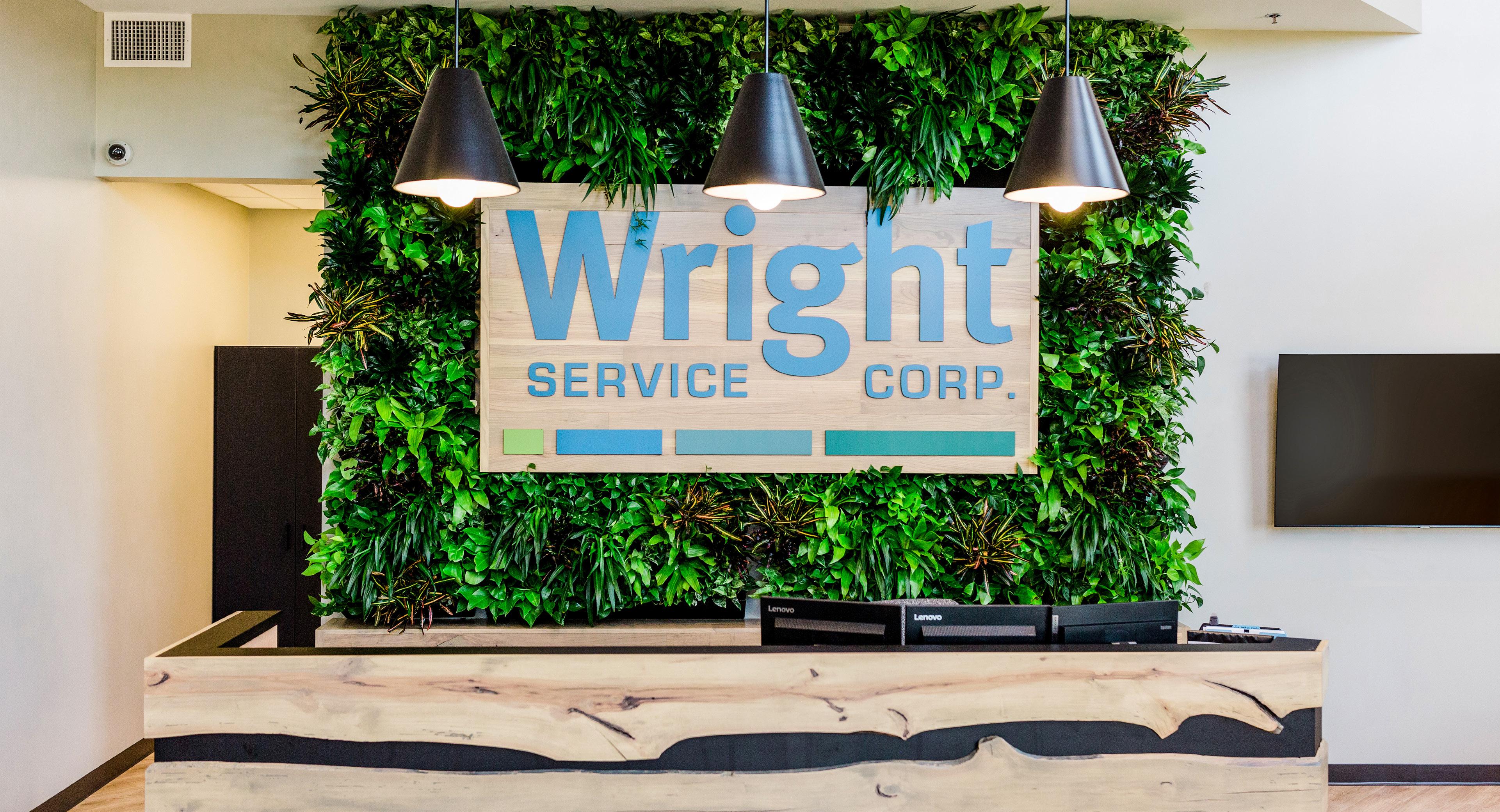
An evaluation utilizing the EcoPractices® platform, a proprietary tool created and owned by Sustainable Environmental Consultants, a Wright Service Corp. (WSC) subsidiary, in partnership with WSC. This report is intended to showcase the sustainability journey of CNUC, dedicated to recognizing their responsibility toward their mission, vision and values for their employee owners, partners, clients, and the public. This Corporate Social Responsibility Report will be further expanded upon in the coming years to comply with the Global Reporting Initiative (GRI) standards.
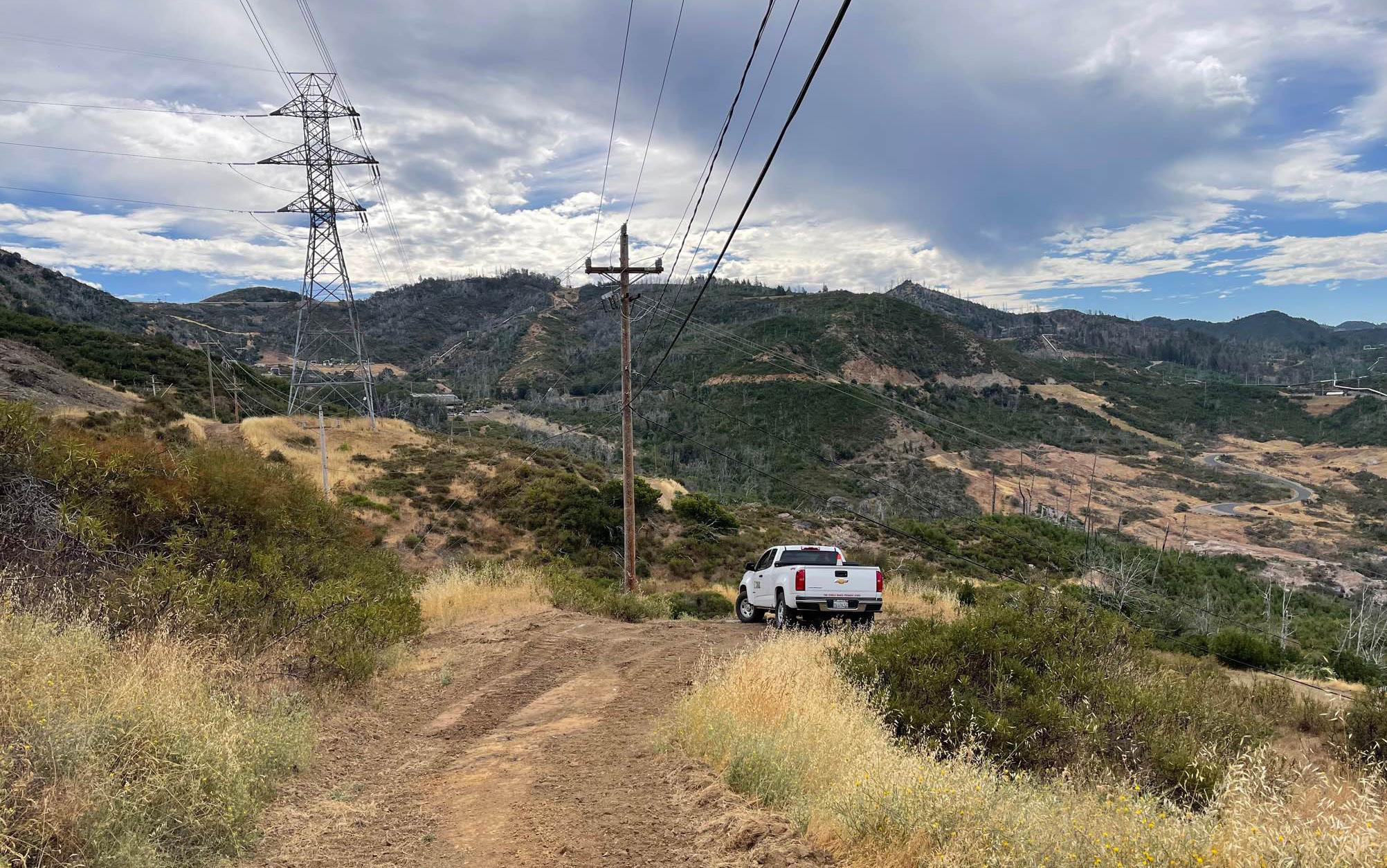
This Corporate Social Responsibility Report will be further expanded upon in the coming years to comply with the Global Reporting Initiative (GRI) standards.


